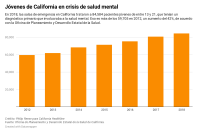Latest KFF Health News Stories
The Supreme Court announced it wouldn’t take up Remington’s appeal of a ruling by Connecticut’s top court to allow the lawsuit proceed, despite a federal law that broadly shields firearms manufacturers from liability when their weapons are used in crimes.
CMS Administrator Seema Verma delivered a fiery speech to the nation’s 56 state and territorial Medicaid directors in Washington, D.C., on Tuesday, covering a range of issues. She also defended her decision to hire allies as outside contractors to help her develop a communications strategy.
First Edition: November 13, 2019
Today’s early morning highlights from the major news organizations.
Perspectives: When It Comes To Curbing High Drug Costs, Good Intentions Aren’t Enough To Cut It
Read recent commentaries about drug-cost issues.
One In Five Americans Can’t Afford Prescriptions With Gender Gap Getting Increasingly Worse
While nearly 23 percent of Americans in general said they couldn’t afford a prescription, the gender breaks down into 27.5% of women reporting difficulties and 18.9% of men. Read about that and more pharmaceutical development and pricing stories in this week’s Prescription Drug Watch round up.
More Vapers Are Making Their Own Juice, But Not Without Risks
It’s easy to buy all the supplies online, and thousands of e-liquid recipes on the internet walk people through all the steps. But experts warn about safety.
Medicaid Tweak Might Offer Means To Improve U.S. Maternal Health
Many pregnant women lose health coverage shortly after delivery. Democratic presidential candidates are eyeing the issue, and some experts say making Medicaid more accessible to new moms could be an answer.
Verma Attacks Critics Of Medicaid Work Requirement, Pushes For Tighter Eligibility
The Trump administration’s top Medicaid official says the effort to thwart these work mandates “stifles innovation.”
Más adolescentes buscan atención médica para sus problemas de salud mental
En 2018, los servicios de urgencias de California trataron a 84,584 pacientes jóvenes, de 13 a 21 años, con un diagnóstico primario relacionado con la salud mental.
Editorial pages focus on these health topics and others.
Opinion writers weigh in on how to reduce rising health care costs and improve quality of care.
Media outlets report on news from California, North Carolina, Kansas, Oregon, Georgia, Illinois, Washington, Ohio, Texas, and Missouri.
The case comes as prosecutors across the country use the criminal court system to crack down on the people who play a role in the opioid epidemic. In other news on the crisis: DEA’s pursuit of information on Colorado’s pharmacies, a look at addiction while in jail, a study on the dangers of opioid-substitute kratom.
Often times any conversation between the two sides can be viewed as a zero sum game, but those in the middle say it doesn’t have to be.
Virginia Doctor Charged With Mutilating Women, Performing Hysterectomies Without Patients Consent
Javaid Perwaiz, an obstetrician-gynecologist in Chesapeake, Va., was arrested Friday and charged with health care fraud and making false statements relating to health care matters. A complaint filed in U.S. District Court details his alleged proclivity for convincing Medicaid recipients to undergo operations they didn’t need, sometimes every year.
The results of a study from 2005 to 2016 in the Journal of the American College of Cardiology predict a 15% to 20% reduction in risk of heart attack and strokes, but doctors say many Americans still don’t know if they have high cholesterol, a key risk factor for heart disease. Public health news is also on: breast cancer prevention, safety of contact sports for kids, racial bias’ influence on heart transplant decisions, Omega-3s fail to aid mental health, and an increase in big hurricanes over a century ago.
Self-harm behavior, like cutting, can often be met with fear and an overreaction from parents. But now researchers are starting to better understand the root causes of such actions. In other mental health news: sadfishing, teens seeking care for crises, and a call to action in San Francisco.
‘A Historic Milestone’: Merck’s Ebola Vaccine First-Ever To Get Approval From European Commission
The vaccine, Ervebo, has already been used under emergency guidelines to help contain an Ebola outbreak in the Democratic Republic of the Congo.
Nearly 70,000 Migrant Children Were Detained In U.S. Custody This Year, Up 42 Percent From 2018
The number of children held separated from their parents exceeds any other country in the world, according to United Nations researchers. Meanwhile, the Supreme Court is set to hear arguments on “Dreamer” protections on Tuesday.
Trump Meeting With Vaping Industry, Medical Professionals As He Nears Decision On E-Cigarette Ban
The meeting aims to “come up with an acceptable solution to the Vaping and E-cigarette dilemma,” President Donald Trump wrote in a tweet Monday morning. “Children’s health & safety, together with jobs, will be a focus!” Advocates worry the meeting signals that the president is backing off of a promised ban on flavored e-cigarettes. Meanwhile, a hospital announced it’s performed a double-lung transplant on a patient with the vaping-related illness.






